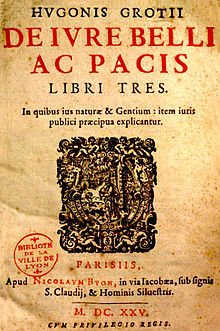
Hugo Grotius, also known as Hugo de Groot or Huig de Groot, was a Dutch humanist, diplomat, lawyer, theologian, jurist, statesman, poet and playwright. A teenage prodigy, he was born in Delft and studied at Leiden University. He was imprisoned in Loevestein Castle for his involvement in the controversies over religious policy of the Dutch Republic, but escaped hidden in a chest of books that was transported to Gorinchem. Grotius wrote most of his major works in exile in France.

Jean Barbeyrac was a French jurist.

Samuel Freiherr von Pufendorf was a German jurist, political philosopher, economist and historian. He was born Samuel Pufendorf and ennobled in 1694; he was made a baron by Charles XI of Sweden a few months before his death at age 62. Among his achievements are his commentaries and revisions of the natural law theories of Thomas Hobbes and Hugo Grotius.
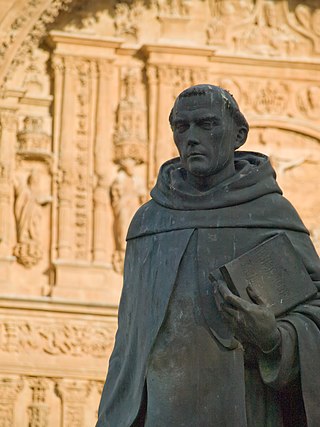
Francisco de Vitoria was a Spanish Roman Catholic philosopher, theologian, and jurist of Renaissance Spain. He is the founder of the tradition in philosophy known as the School of Salamanca, noted especially for his concept of just war and international law. He has in the past been described by scholars as the "father of international law", along with Alberico Gentili and Hugo Grotius, though some contemporary academics have suggested that such a description is anachronistic, since the concept of postmodern international law did not truly develop until much later. American jurist Arthur Nussbaum noted Vitoria's influence on international law as it pertained to the right to trade overseas. Later this was interpreted as "freedom of commerce".
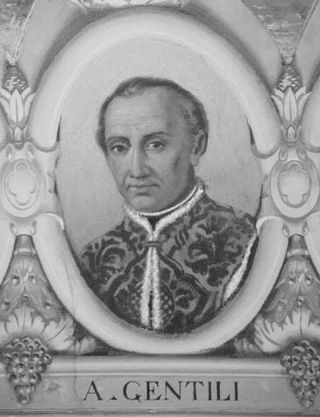
Alberico Gentili was an Italian jurist, a tutor of Queen Elizabeth I, and a standing advocate to the Spanish Embassy in London, who served as the Regius professor of civil law at the University of Oxford for 21 years. He is regarded as the co-founder of the field of international law, and thus known as the "Father of international law". The first medieval writer on public international law,in 1587 Gentili became the first non-English person to be a Regius Professor. He also authored numerous books, which are recognized to be among the most essential sources for international legal doctrines, yet that also include theological and literary subjects.

Scipione Gentili was an Italian law professor and a legal writer. One of his six brothers was Alberico Gentili, one of the fathers of international law.
The ius gentium or jus gentium is a concept of international law within the ancient Roman legal system and Western law traditions based on or influenced by it. The ius gentium is not a body of statute law nor a legal code, but rather customary law thought to be held in common by all gentes in "reasoned compliance with standards of international conduct".

Cornelis van Bijnkershoek was a Dutch jurist and legal theorist who was educated at the University of Franeker. After two years study, he began to apply himself to jurisprudence. He resolved to reform the common law of his country, and took as the basis of a new system the principles of Roman law.
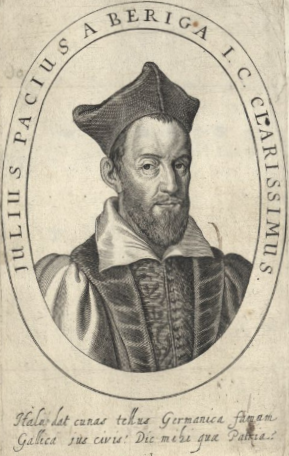
Giulio Pace de Beriga, also known as Giulio Pacio, or by his Latin name Julius Pacius of Beriga was a well-known Italian Aristotelian scholar and jurist.

James Brown Scott was an American legal scholar. He founded the law school at University of Southern California and was professor of law at University of Illinois, Columbia University, George Washington University, and Georgetown University. He was editor in chief of the American Journal of International Law, played a key role in founding the American Society of International Law, and was an expert to the United States delegation at the Second Hague Peace Conference.
The history of international law examines the evolution and development of public international law in both state practice and conceptual understanding. Modern international law developed out of Renaissance Europe and is strongly entwined with the development of western political organisation at that time. The development of European notions of sovereignty and nation states would necessitate the development of methods for interstate relations and standards of behaviour, and these would lay the foundations of what would become international law. However, while the origins of the modern system of international law can be traced back 400 years, the development of the concepts and practises that would underpin that system can be traced back to ancient historical politics and relationships thousands of years old. Important concepts are derived from the practice between Greek city-states and the Roman law concept of ius gentium. These principles were not universal however. In East Asia, political theory was based not on the equality of states, but rather the cosmological supremacy of the Emperor of China.
Temperamenta Belli means moderation in the conduct of war. This term is used in Hugo Grotius's work De jure belli ac pacis (1625) which dealt with international relations. It is also mentioned in works of members of the so-called English School of international relations thought such as Hedley Bull's The Anarchical Society: A Study of Order in World Politics.
Progressive war is a military strategy in which only enemy combatants are targeted, and non-combatants killed or wounded by collateral damage are kept to a minimum. Its principles were established by Dutch jurist Hugo Grotius, who is considered to be a founder of international law, in his book De jure belli ac pacis libri tres, published in 1625. A successful practitioner was Helmuth von Moltke the Elder, as chief of staff of the Prussian Army in the 19th century.
Benedict William Kingsbury is Vice Dean and Director of the Institute for International Law and Justice at New York University and a leading scholar in international law and diplomacy. He was recently also announced as a faculty director for the new NYU Law Guarini Institute for Global Legal Studies. Born in Holland and raised in Hamilton, New Zealand he was a Rhodes Scholar in 1982, a commercial law graduate from Canterbury University in Christchurch, New Zealand and a doctor of International Relations and Law at Balliol College, University of Oxford. He lectured at Oxford University and Duke University prior to his New York University Law School appointment. He is an honorary citizen of San Ginesio in Italy, the birthplace of Alberico Gentili (1552-1608). He received an honorary doctorate in law from Tilburg University in 2016. From 2013 to 2018 he was joint Editor in Chief of the American Journal of International Law. He received NYU Law School's Podell Distinguished Teaching Award in 2019.
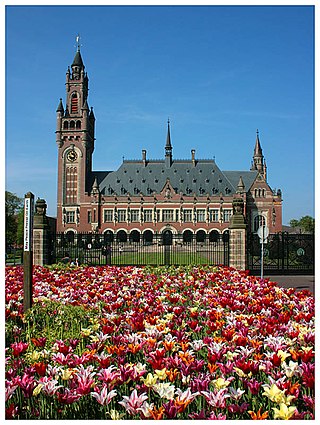
The Peace Palace Library is a collection of studies and references specializing in international law. It is located in The Hague, Netherlands, and was established to support the Permanent Court of Justice.

The Anthology of Planudes, is an anthology of Greek epigrams and poems compiled by Maximus Planudes, a Byzantine grammarian and theologian, based on the Anthology of Cephalas. It comprises 2,400 epigrams.

Sibrandus Lubbertus (c.1555–1625) was a Dutch Calvinist theologian and was a professor of theology at the University of Franeker for forty years from the institute's foundation in 1585. He was a prominent participant in the Synod of Dort (1618–1619). His primary works were to counter Roman Catholic doctrine and to oppose Socinianism and Arminianism.
Ordinum Hollandiae ac Westfrisiae pietas is a 1613 book on church polity by Hugo Grotius. It was the first publication of Grotius, a prominent jurist and Remonstrant, concerned with the Calvinist-Arminian debate and its ramifications, a major factor in the politics of the Netherlands in the 1610s. The Ordinum pietas, as it is known for short, gave a commentary on the Five Articles of Remonstrance of 1610 that were the legacy of the theological views of Jacobus Arminius, who died in 1609.

Johann Jacob Vitriarius was a Dutch jurist of German descent.
Diego Álvarez was a Spanish theologian who opposed Molinism. He was archbishop of Trani from 1607 to his death.
